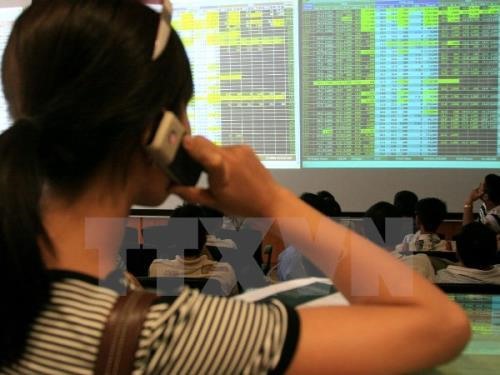 Economy
Economy

Although the VN-Index didn’t hit the short-term target of 1,130 points last week as expected, it has nevertheless maintained its upward trend and is forecast to open next week’s session with positive status.
 |
| Although the VN-Index didn’t hit the short-term target of 1,130 points last week as expected, it has nevertheless maintained its upward trend and is forecast to open next week’s session with positive status.— VNA/VNS Photo |
HÀ NỘI — Although the VN-Index didn’t hit the short-term target of 1,130 points last week as expected, it has nevertheless maintained its upward trend and is forecast to open next week’s session with positive status.
The benchmark VN-Index on the HCM Stock Exchange (HOSE) gained 0.49 per cent to settle at 1,121.21 points on Friday, recovering from its one-day decline of 0.51 per cent.
Meanwhile, the HNX Index on the Hà Nội Stock Exchange (HNX) inched up 0.91 points to end at 128.25 points. The index was down 0.74 per cent to end at 127.10 points on Thursday.
The two stock indices witnessed a weekly rise of 1.67 per cent and 1.6 per cent, respectively, due to positive investor psychology and strong cash flows poured into large-cap stocks.
An average of more than 286.65 million shares were traded in each session last week, worth VNĐ8.23 trillion (US$361.5 million).
The trading figures were up 19.5 per cent in volume and 21 per cent in value, compared to the previous trading week’s numbers.
The UPCOM Index on the Unlisted Public Company Market (UPCoM) gained slightly 0.58 per cent to finish at 60.17 points. The index was down 0.74 per cent to end at 127.10 points on Thursday.
Furthermore, the unlisted market index gained 1.02 per cent after the five trading sessions of the week.
According to Bảo Việt Securities Company (BVSC), the VN-Index is expected to surpass the peak of 1,130 set before the Tết (Lunar new year) holiday soon after successfully testing the 1,095-1,100 support zone and reverting to an uptrend last Friday, opening a possibility that the index will hit a record high of 1,180-1,190 in the short term.
“However, the index can still experience some volatility with alternate corrections while moving upward,” BVSC said.
BIDV Securities Company (BSC) forecast in its monthly report that the market will likely turn upward in March and could possibly exceed its previous recent peak of 1,130 points and even surpass the all-time peak of 1,179 in 2007.
The market will be led by the strong cash flow poured into financial-banking stocks, BSC said, adding that the market will receive more supportive information in March.
Listed companies’ holding annual shareholders’ meetings, Q1 earnings announcement, dividend payment plan and 2018 business plans will be short-term supporting information for investors, greatly influencing the market performance in the short-term, BSC said.
The upcoming equitisation, divestment and listings of companies will also attract investors, it added.
Three State-owned enterprises (SOEs) will make initial public offerings (IPOs) in March. Việt Nam Southern Food Corporation (Vinafood 2) will auction 114.8 million shares, or 23 per cent of its charter capital, on March 14.
Meanwhile, Bình Dương Manufacturing & Import Export Corp (Protrade Corp) will auction 30 million shares, or 10 per cent of its charter capital on March 28.
Hà Nội Trade Corporation (Hapro) will auction 76 million shares or 34.51 per cent of its charter capital on March 30.
In terms of capital withdrawal, the State Capital Investment Corporation (SCIC) has recently announced its plan to sell 24.1 million shares at the Bình Minh Plastics Joint Stock Company (BMP) on March 9.
Notably, three major oil and gas companies, Bình Sơn Refining and Petrochemical Company (BSR), PetroViệt Nam Power Corporation (PV Power) and Việt Nam Oil Corporation (PV Oil) have or will be listed on Upcom on March 1, March 6 and 7.
“Early listing of equitised companies will contribute to increase the market capitalisation, adding more options for investors and involving them in the equitisation process of state-owned enterprises,” BSC said.
The HCM Stock Exchange (HoSE) will officially launch covered warrants in late March, which will expand investment choice and attract more foreign capital to the market.
This will be the fourth product traded on
Covered warrants, issued by a securities company, allow the holder to buy (call warrant) or sell (put warrant) the underlying stock (including shares, bonds or other securities) at a specific price on or before a pre-determined date. It is expected to become a new investment tool for investors to reduce the chance of risks, and to provide more options at a lower cost, as compared to common stocks and fund certificates.
According to BSC, the launch of covered warrant shows signs that the local market is renovating, integrating with regional and international markets. — VNS




